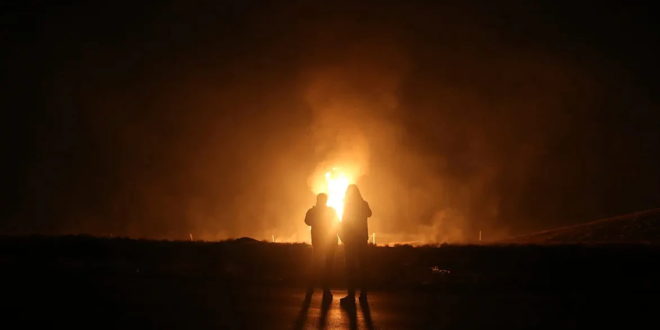Israel was behind clandestine strikes on two critical gas pipelines inside Iran this week, which disrupted the flow of gas to millions of citizens in the middle of winter, according to western officials and a military strategist affiliated with Iran’s Islamic Revolutionary Guard Corps (IRGC) who spoke with the New York Times (NYT).
The unnamed officials called the Israeli sabotage attack “a major symbolic strike” and “a stark warning of the damage that Israel could inflict” as the country sinks deeper into conflict with the Resistance Axis.
According to the report, Tel Aviv was also responsible for a “separate blast on Thursday inside a chemical factory on the outskirts of Tehran that rattled a neighborhood and sent plumes of smoke and fire into the air.” However, Iranian officials say the factory explosion was caused by an accident.
On 14 February, twin explosions hit Iranian pipelines that carry around 57 million cubic meters of natural gas and run for more than 1,000 kilometers in the provinces of Fars and Chahar Mahal Bakhtiari. The disruption temporarily took out around a sixth of Iran’s daily natural gas production, causing outages in several regions.
“The enemy’s plan was to completely disrupt the flow of gas in winter to several main cities and provinces in our country,” Iran’s Oil Minister, Javad Owji, said on Friday. He had previously called the blasts an “act of sabotage” and “terrorist attacks,” adding that the attack aimed to stir domestic discontent.
The unnamed Iranian official who spoke with the NYT said the attackers “required deep knowledge of Iran’s infrastructure and careful coordination.”
Tel Aviv has a long history of assassinating Iranian officials and nuclear scientists and has been behind sabotage attempts in several nuclear and military facilities in Iran.
Israeli attacks on Iranian targets escalated since the start of the year after Tel Aviv assassinated two senior IRGC commanders in Syria. The killings led to a decisive response from Tehran, which saw the destruction of an alleged Mossad base in northern Iraq.
The Islamic Republic also suffered one of the largest terror attacks in its history in January when ISIS militants killed about 100 people in Kerman during a ceremony commemorating the death of Quds Force commander Qassem Soleimani.
During the Syria war, which lasted from 2011 to 2018, Israeli officials acknowledged providing support to the official Al-Qaeda affiliate in Syria, the Nusra Front, which spun off from its mother organization, ISIS.
 Eurasia Press & News
Eurasia Press & News


